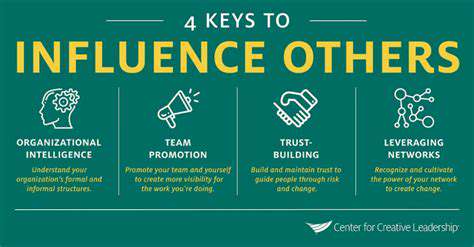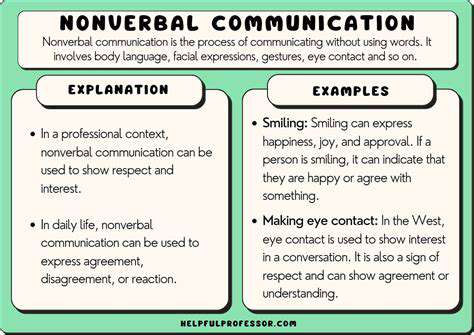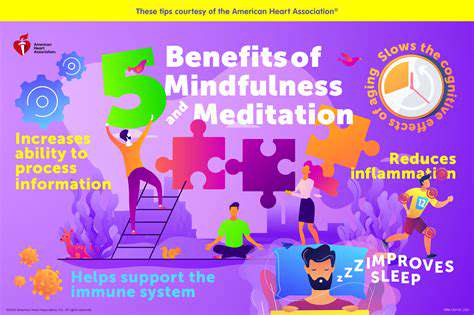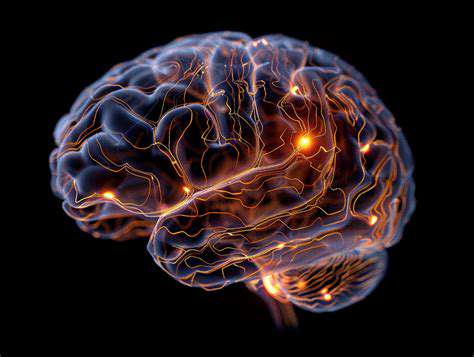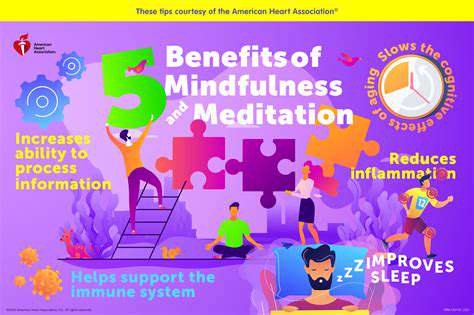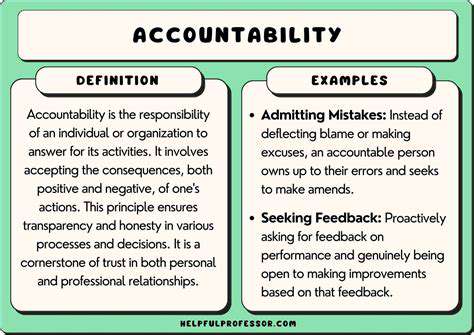The Importance of Social Interaction for Mental and Emotional Well being
Why Social Interaction Matters
Benefits of Social Interaction on Mental Health
Social interaction plays a crucial role in maintaining mental health. Engaging with others helps reduce feelings of loneliness and isolation, which are often linked to various mental health issues such as depression and anxiety. By fostering relationships, individuals can create a supportive network that encourages emotional expression and sharing of experiences.
Moreover, regular social interactions can stimulate the release of neurotransmitters like serotonin and oxytocin, which are essential for mood regulation and overall happiness. These chemical changes in the brain can lead to improved emotional resilience and a greater capacity to cope with stress.
Additionally, being part of a community or group can lead to increased self-esteem and a sense of belonging. When individuals feel connected to others, they are more likely to engage in healthy behaviors and seek support when needed, contributing to better mental health outcomes.
The Role of Social Interaction in Emotional Well-being
Emotional well-being is significantly influenced by the quality and quantity of social interactions a person has in their life. Engaging with others provides opportunities for emotional support, where friends and loved ones can offer advice, understanding, or simply a listening ear during difficult times. This connection can facilitate healing and promote a balanced emotional state.
Furthermore, social interactions allow for the sharing of positive experiences, laughter, and joy, which can lift one's mood and foster a more optimistic outlook on life. Celebrating achievements and milestones with others enhances feelings of happiness and contentment, contributing to a richer emotional experience.
Lastly, social interactions encourage individuals to step out of their comfort zones and engage in new activities, which can lead to personal growth. Exposure to diverse perspectives and experiences through social connections fosters empathy and emotional intelligence, both vital for navigating life's complexities and building fulfilling relationships.
The Psychological Benefits of Connecting with Others
The Role of Social Support in Mental Health
Social support is a critical component of mental health, as it significantly influences our emotional resilience and coping strategies. When individuals face stressors or challenges, having a strong network of friends and family can provide reassurance, guidance, and a sense of belonging. This support system can help buffer against the negative effects of stress, making it easier to manage life's difficulties.
Moreover, regular interactions with supportive individuals can help reduce feelings of loneliness and isolation. These connections contribute to a sense of community and improve overall life satisfaction, which is essential for maintaining good mental health over time.
Enhancing Emotional Intelligence Through Social Engagement
Engaging with others in social settings helps individuals develop emotional intelligence, a skill crucial for understanding and managing one's own emotions as well as empathizing with others. Through conversations, shared experiences, and conflicts, people learn to navigate complex emotional landscapes, which can enhance their ability to communicate effectively and build stronger relationships.
Moreover, emotional intelligence plays a significant role in emotional regulation. By observing and interacting with a variety of emotional responses in others, individuals can refine their own emotional responses, leading to healthier relationships and improved interactions in both personal and professional spheres.
The Influence of Group Dynamics on Personal Growth
Participating in group activities or community events fosters personal growth by exposing individuals to diverse perspectives and ideas. Being part of a group encourages discussions that challenge personal beliefs, thus broadening horizons and facilitating growth. This process can lead to greater self-awareness and a deeper understanding of different cultures and viewpoints.
Additionally, group settings can enhance motivation and accountability. Working alongside others can inspire individuals to set and achieve personal goals, whether they involve fitness, education, or creative pursuits. This collective effort nurtures a sense of achievement and belonging, integral to emotional well-being.
Combating Mental Health Issues Through Social Interaction
Social interactions serve as a powerful tool in combating mental health issues such as anxiety, depression, and stress. Regular engagement with peers provides an outlet for sharing thoughts and feelings, leading to a decrease in the burdens of mental distress. Venting frustrations and discussing emotions with friends or support groups can significantly lighten the emotional load.
Furthermore, participating in social activities like group therapy or community service can instill a sense of purpose and fulfillment. These interactions remind individuals of their value within a community context and can foster hope and positivity, essential components in the journey to recovery from mental health challenges.
Social Interaction and Physical Health
Understanding the Connection Between Social Interaction and Physical Health
Social interaction plays a vital role in maintaining not only mental and emotional well-being but also physical health. Engaging with others can lead to better lifestyle choices, such as increased physical activity and healthier eating habits. When individuals are socially connected, they are more likely to participate in regular exercise, attend health screenings, and make dietary improvements, all of which contribute to overall physical health.
Moreover, studies have demonstrated that individuals with strong social ties often experience lower levels of stress and inflammation. This suggests that social interaction may have a protective effect against certain chronic conditions, making it an essential component of a holistic health approach.
The Role of Social Support in Recovery from Illness
Social support is crucial for recovery from illness and maintaining a healthy lifestyle. Individuals who have strong social networks often report better health outcomes and a faster recovery process after medical treatments. Supportive friends and family provide emotional encouragement and practical assistance, which can alleviate feelings of isolation and helplessness during challenging times.
Research has shown that patients with robust social ties tend to adhere better to treatment plans and are more motivated to engage in healthy behaviors. This highlights the importance of fostering social connections as part of any comprehensive healthcare strategy.
The Impact of Technology on Social Interactions
In today’s digital age, technology has transformed the way we interact with each other. Social media platforms, instant messaging, and video calls enable people to maintain connections regardless of geographical barriers. While these tools can enhance communication, they also raise questions about the quality of interactions and the potential for superficial relationships.
It's essential to strike a balance between on-screen and face-to-face interactions. Quality conversations and shared experiences foster deeper connections that can positively impact mental health. Understanding how to use technology mindfully can augment our social lives without replacing genuine in-person relationships.
Barriers to Social Interaction and Their Solutions
Despite the clear benefits of social interaction, various barriers can hinder individuals from forming connections. Factors like geographic distance, health issues, and social anxiety can create significant obstacles. Identifying and addressing these barriers is essential for enhancing social engagement.
Community programs, support groups, and online platforms can help individuals overcome these challenges. Initiatives that promote inclusivity and provide accessible resources are crucial in fostering environments where everyone feels comfortable engaging socially.
Promoting Social Interaction in Communities
Communities play a vital role in encouraging social interaction among their members. Organizations and local governments can create initiatives that promote gatherings, events, and activities designed to bring people together. Such efforts not only build a sense of belonging but also strengthen community ties.
Volunteering, community centers, and local clubs provide excellent opportunities for individuals to connect with others. The benefits of communal activities extend beyond personal well-being; they foster collective resilience, making communities stronger and more supportive.
The Role of Technology in Modern Socialization

The Changing Landscape of Communication
In today's digital age, the methods in which we communicate have evolved significantly. People now connect through various platforms such as social media, texting, and video calls, all of which have reshaped the traditional norms of socialization.
Technology has bridged geographical gaps, allowing individuals to maintain relationships across vast distances. Virtual engagement can be just as impactful as face-to-face interaction in many cases.
However, this shift also presents challenges. The lack of physical presence can lead to miscommunication and a sense of disconnect among users.
Moreover, the prevalence of online communication has made it easier to curate personal narratives, sometimes resulting in inauthentic interactions.
Understanding these dynamics is essential for fostering genuine connections in a technology-driven world.
The Psychological Effects of Online Interaction
Research indicates that online interactions can significantly influence our mental health and emotional state. Many individuals find solace in online communities that provide support and camaraderie.
Conversely, excessive reliance on digital communication can lead to feelings of loneliness and isolation. This phenomenon is often termed "social media fatigue," where users become overwhelmed by the demands of maintaining an online presence.
It's also important to recognize that the quality of online socialization matters. Meaningful exchanges can boost our emotional well-being, whereas superficial interactions may have the opposite effect.
Furthermore, the anonymity provided by the internet can lead to both positive and negative results, encouraging openness but also resulting in cyberbullying.
Cultivating awareness about these psychological effects is vital for individuals navigating their social lives in a tech-centric society.
The Balance Between Virtual and Real-Life Connections
Finding a healthy balance between online and offline interactions is crucial for maintaining overall well-being. While technology offers convenience, nothing can replace the essence of in-person communication.
Studies have shown that face-to-face interactions significantly contribute to emotional health, enhancing feelings of belonging and trust.
Moreover, real-life interactions often provide non-verbal cues that are lost in virtual communication, enriching our social experiences.
To achieve this balance, individuals need to be intentional about their social choices, setting aside time for in-person gatherings.
Creating a schedule that includes both online and offline interactions can help reinforce social bonds and foster a stronger sense of community.
The Future of Social Interaction
As technology continues to advance, the way we socialize is likely to undergo further transformations. Innovations such as virtual reality (VR) are already paving the way for novel social experiences, allowing users to interact in simulated environments.
While such technologies hold promise, they also necessitate careful consideration of their implications for emotional health. The challenge lies in ensuring that these advancements do not replace important human connections but rather enhance them.
Future trends may also see a rise in hybrid models of socialization, combining both virtual and physical interactions. This could redefine social norms and create diverse avenues for connection.
Ultimately, fostering social interactions that prioritize emotional well-being will be essential as we navigate this evolving landscape.
By remaining open to new forms of communication while valuing traditional connections, we can shape a more connected future.
Building Meaningful Connections

Encouraging Open Communication
Effective communication is essential for building strong relationships. When individuals express their thoughts and emotions openly, it fosters an environment of trust and understanding.
This open dialogue not only helps in resolving conflicts but also strengthens bonds, making connections more resilient over time.
Enhancing Self-esteem through Support
Supportive social interactions can significantly boost an individual’s self-esteem. When people feel valued and appreciated by their peers, it enhances their sense of self-worth.
This boost in self-esteem often translates into improved mental health, making individuals more resilient against challenges they may face.
Combating Feelings of Loneliness
Loneliness can have detrimental effects on mental health, contributing to issues like depression and anxiety. Engaging in social activities provides a remedy by making individuals feel more connected to others.
By actively participating in social interactions, people can reduce feelings of isolation and create a support system that enriches their lives.
Promoting Emotional Resilience
Building meaningful connections contributes greatly to emotional resilience. Through supportive relationships, individuals find strength in times of difficulty and can better cope with stress.
The ability to share experiences and seek advice from friends and family can turn challenging situations into manageable ones.
Developing Empathy and Understanding
Social interactions encourage the development of empathy by allowing individuals to see things from different perspectives. Understanding the experiences and emotions of others fosters compassion and leads to deeper connections.
As people connect and share their stories, they cultivate a more inclusive and supportive community, reinforcing the bonds that contribute to overall well-being.
